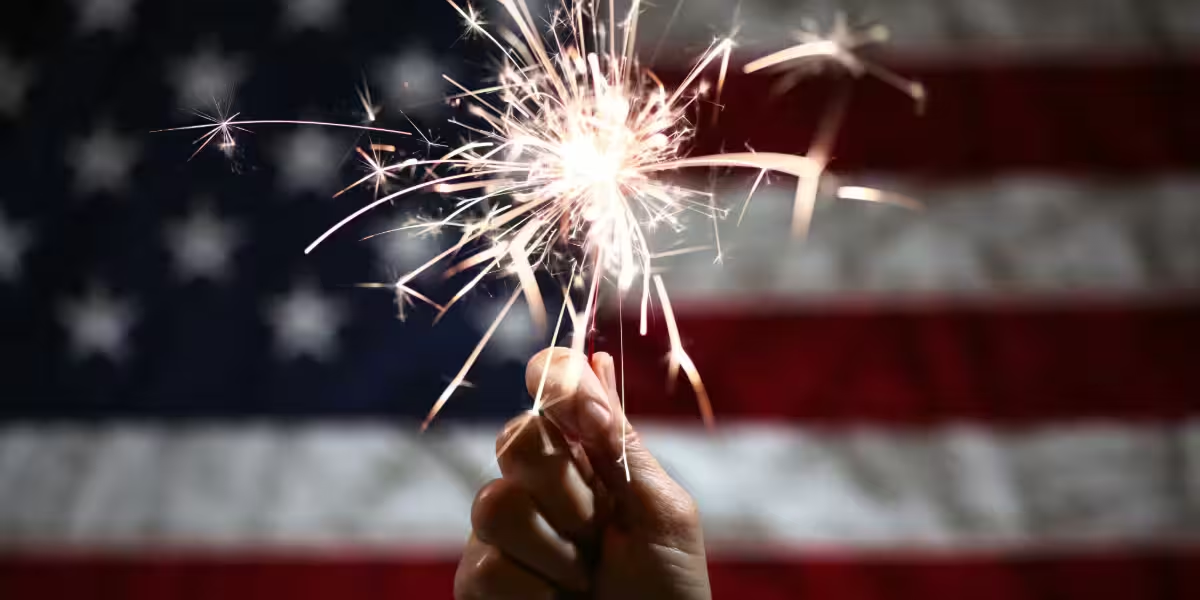
4th of July Safety in Kansas City: Tips for Avoiding Injuries and Civil Liability
The 4th of July is a time of celebration, joy, and national pride. Families and friends gather to enjoy fireworks, barbecues, and various outdoor activities. However, while this holiday is synonymous with fun and festivities, it also comes with its fair share of risks. At Kendall Law Group LLC, we want to ensure your Independence Day is both enjoyable and safe. Here’s a comprehensive guide to 4th of July safety in Kansas City, focusing on preventing personal injuries.
Fireworks Safety
Before you light that fuse, be sure to understand the local regulations surrounding fireworks in Kansas City. In many areas, fireworks are either restricted or completely banned. Make sure to check local ordinances and only use legal fireworks. Illegal fireworks not only pose a significant safety risk but can also lead to fines and legal trouble.
Common Injuries from Fireworks
Irresponsible use of fireworks can cause a range of potential injuries ranging from minor to catastrophic, including:
- Burns: These are the most common type of injury and can range from minor to severe, potentially leading to permanent scarring.
- Eye Injuries: Fireworks can cause eye trauma, including burns, cuts, and even blindness.
- Hearing Damage: The loud noise from fireworks can result in temporary or permanent hearing loss.
- Lacerations and Contusions: Exploding fireworks can cause cuts and bruises from flying debris.
- Amputations: Severe explosions can result in the loss of fingers or limbs.
- Respiratory Issues: The smoke from fireworks can cause respiratory problems, particularly in individuals with pre-existing conditions such as asthma.
- Psychological Impact: Loud explosions can cause anxiety and stress, especially in children and those with PTSD.
Kansas City Firework Injury, Who is Liable?
Liability for firework injuries can depend on several factors, including how and where the fireworks were used. Potentially liable parties
- The Person Using the Fireworks: If an individual improperly uses fireworks and causes injury, they can be held liable for negligence.
- Manufacturers and Distributors: If a defect in the firework causes it to malfunction and injure someone, the manufacturer or distributor may be liable under product liability laws.
- Event Organizers: If fireworks are used at a public event and injuries occur due to improper handling or inadequate safety measures, the event organizers could be held responsible.
- Property Owners: If a property owner allows fireworks to be used on their property and someone is injured, the property owner might be liable, especially if they did not take reasonable steps to ensure safety.
- Local Governments: In some cases, local governments could be held liable if they fail to enforce regulations that could have prevented the injury.
Legal Considerations for Firework Injury Claims
- Negligence: To prove negligence, the injured party must show that the defendant owed a duty of care, breached that duty, and caused the injury.
- Strict Liability: In product liability cases, manufacturers can be held strictly liable if a defective firework causes injury, regardless of whether they were negligent.
- Premises Liability: Property owners may be liable if they fail to maintain a safe environment and someone is injured as a result.
Safe Handling Tips
- Read Instructions: Always read and follow the instructions on fireworks packaging.
- Adult Supervision: Ensure that an adult supervises all fireworks activities. Children should never handle fireworks.
- Distance: Keep a safe distance. Light fireworks one at a time, then move back quickly.
- Water Source: Always have a bucket of water or a garden hose handy in case of fire.
- Disposal: Soak used fireworks in water before disposing of them to prevent any latent fires.
Celebratory Gunfire: Understanding the Dangers
Celebratory gunfire refers to the act of shooting firearms into the air in celebration, often during holidays, New Year’s Eve, or other significant events. This practice is dangerous because bullets fired into the air can travel long distances and return to the ground at high speeds, potentially causing injury or death when they strike people or property.
Celebratory gunfire is a recognized problem in the Kansas City Metro, especially during certain times of the year, such as New Year’s Eve and the Fourth of July. The risks associated with this activity have led to numerous injuries and fatalities over the years. Local authorities and law enforcement agencies in Kansas City regularly issue warnings and reminders about the dangers of celebratory gunfire, emphasizing that what goes up must come down, and the potential for harm is significant.
Legal Consequences
In Kansas City, celebratory gunfire is strictly prohibited. Discharging a firearm within city limits is illegal and can result in significant fines, criminal charges, and imprisonment. Law enforcement agencies take this issue seriously, and increased patrols and surveillance are common during holidays like the 4th of July.
Other Consequences of Celebratory Gunfire
The potential consequences of celebratory gunfire can be severe and wide-ranging, including but not limited to:
- Injury and Death: Bullets fired into the air can travel significant distances and fall back to the ground at high speeds. When they strike people, they can cause serious injuries or fatalities. These injuries can be particularly severe since bullets can penetrate roofs, vehicles, and other structures.
- Property Damage: Falling bullets can damage buildings, vehicles, and other property. This damage can be costly to repair and may also cause secondary injuries to individuals who are struck by debris.
- Legal Consequences: Discharging a firearm within city limits or in a reckless manner is illegal in many places, including Kansas City. Individuals caught engaging in celebratory gunfire can face criminal charges, including fines and imprisonment. The specific charges can range from misdemeanor offenses to more serious felony charges if someone is injured or killed.
- Public Safety Strain: Incidents of celebratory gunfire can strain public safety resources. Emergency services may be overwhelmed by the need to respond to multiple incidents, diverting resources from other critical areas.
- Community Fear and Disruption: The sound of gunfire can cause panic and fear within the community, disrupting celebrations and leading to unnecessary stress and anxiety among residents.
- Negative Community Impact: Celebratory gunfire can harm the reputation of neighborhoods or communities, leading to increased concerns about safety and potentially affecting property values and community cohesion.
Safety Measures
- Report Suspicious Activity: If you hear or see someone engaging in celebratory gunfire, immediately report it to the authorities.
- Stay Indoors: During peak times for celebratory gunfire (usually around midnight), stay indoors to reduce the risk of being hit by a stray bullet.
- Educate Others: Spread awareness about celebratory gunfire’s dangers and legal repercussions. Encourage your community to celebrate safely and responsibly.
Barbecue Safety
Barbecues are a staple of 4th of July celebrations, but they also pose potential hazards. Here is how to keep your grilling safe:
- Check the Grill: Inspect your grill for any gas leaks, blockages, or rust before use.
- Location: Position your grill away from structures, overhanging branches, and flammable materials.
- Starter Fluid: If you’re using a charcoal grill, use only starter fluid designed for barbecues. Never add lighter fluid to an already lit fire.
- Supervision: Never leave the grill unattended and keep children and pets at a safe distance.
- Cleanliness: Clean the grill after each use to prevent grease fires.
Water Safety
Swimming and Boating
Whether you are hitting the pool, lake, or river, water activities are a fantastic way to cool down and have fun. However, water safety is crucial to prevent drownings and other injuries:
- Supervision: Always supervise children near water. Designate a responsible adult to keep an eye on swimmers.
- Life Jackets: Use life jackets, especially for young children and weak swimmers. Ensure the life jacket is U.S. Coast Guard-approved.
- Alcohol: Avoid consuming alcohol when swimming or boating. Alcohol impairs judgment and coordination, increasing the risk of accidents.
- Boating Rules: Follow all boating laws and regulations. Make sure your boat is equipped with necessary safety gear, including life vests, a first aid kit, and a fire extinguisher.
Sun and Heat Safety
Staying Cool
The 4th of July often involves prolonged exposure to the sun, which can lead to sunburn, dehydration, and heat-related illnesses. Here are some tips to stay cool and protected:
- Hydration: Drink plenty of water throughout the day. Avoid excessive consumption of sugary and alcoholic beverages, which can lead to dehydration.
- Shade: Take breaks in the shade, especially during peak sun hours (10 a.m. to 4 p.m.).
- Sunscreen: Apply a broad-spectrum sunscreen with an SPF of at least 30. Reapply every two hours, and after swimming or sweating.
- Protective Clothing: Wear light, loose-fitting clothing, a wide-brimmed hat, and sunglasses to protect your skin and eyes from UV rays.
- Know the Signs: Be aware of the symptoms of heat exhaustion and heat stroke, such as dizziness, nausea, headache, and rapid pulse. Seek medical attention if you or someone else shows these signs.
Road Safety
Travel Tips
The 4th of July is one of the busiest travel days of the year, and increased traffic can lead to a higher risk of accidents. Here is how to stay safe on the roads:
- Plan Ahead: Plan your route and allow extra time to reach your destination. Avoid traveling during peak traffic hours if possible.
- Designated Driver: If you plan to drink, designate a sober driver or use rideshare services. Never drink and drive.
- Seat Belts: Always ensure all passengers wear seat belts. Properly secure children in appropriate car seats or booster seats.
- Defensive Driving: Stay alert and practice defensive driving. Watch out for distracted or impaired drivers and maintain a safe following distance.
- Emergency Kit: Keep an emergency kit in your car, including water, non-perishable snacks, a first aid kit, and basic tools.
Pet Safety
Protecting Your Furry Friends
Pets can become frightened and disoriented by fireworks and large gatherings. Here’s how to keep them safe and calm:
- Indoor Safety: Keep pets indoors during fireworks displays. Create a comfortable, quiet space for them to retreat to.
- Identification: Ensure your pets have up-to-date identification tags and are microchipped in case they get lost.
- Avoid Fireworks: Do not bring pets to fireworks displays or leave them in a car during celebrations. The loud noises and heat can be harmful to them.
- Comfort Items: Provide pets with familiar items, such as their favorite toys or blankets, to help soothe them during noisy celebrations.
Kansas City Personal Injury and Wrongful Death Lawyers
The 4th of July is a wonderful time to celebrate with family and friends, but it is important to prioritize safety to prevent personal injuries. By following these safety tips, you can enjoy a fun and accident-free Independence Day in Kansas City.
If you or a loved one suffer an injury due to someone else’s negligence on the 4th of July, Kendall Law Group LLC is here to help. Contact us for a free consultation to discuss your case and explore your legal options. (816) 531-3100
Additional Resources
Staying Safe in Kansas City: Addressing the Dangers of Street Racing and Unlawful Vehicle Use
Confronting the Surge of Child Gun Deaths
The Deadly Consequences of Speeding: Stay Safe and Slow Down!
Homeowner Safety 101: How to Protect Yourself from Premises Liability Lawsuits






